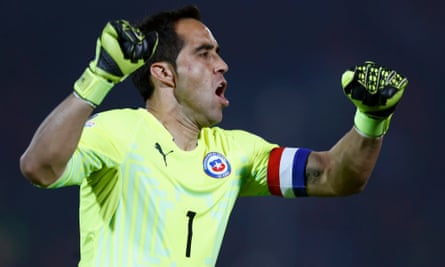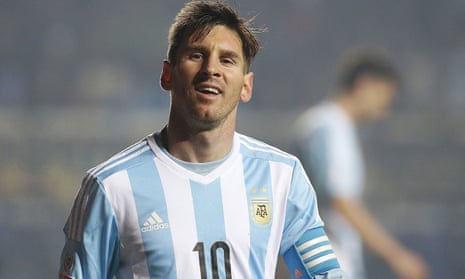The training field echoes with laughter. Someone makes a joke about Lionel Messi, Ezequiel Garay and their shared love of Newell’s Old Boys. The players are, demonstrably, having fun: talk of splits and the destabilising presence of Carlos Tevez seems a long way in the past. Inside, Animal Planet still plays silently on the television in the corner and the technical staff still analyse their data, but they are no longer mumbling darkly about Louis van Gaal giving them a “ruined” Ángel Di María, short on game-time and confidence. Argentina’s mood is noticeably relaxed.
The difference from the tense atmosphere during the first week of the Copa América could hardly be more pronounced. After the draw against Paraguay in the group game Messi paced the corridors by night, wondering how it could be going wrong again. He has been far more involved in this tournament than he was at the World Cup, both on and off the pitch; he has become a captain rather than just the man who wears the armband.
Before the Paraguay semi-final he seemed despairing about his lack of a goal from open play for the national side, talking about how he “wanted to die” when David Ospina recovered to push away his header in the quarter-final. In the mixed zone after the 6-1 semi-final win, by which time his run without a goal from open play had stretched to 918 minutes, he could barely stop grinning.
“He is retranquilo,” said Sergio Agüero, dismissing any thought that the comparative drought is still bothering Messi. “He wins like the team. We know how important he is for the group. What happens is that they all go to mark him, two or three defenders, he draws people to him and that leaves others free.”
That performance against Paraguay in the semi-final, when Messi played a part in all six Argentina goals, has changed everything. Anxiety has become belief; a great generation clearly believes that it is about to achieve fulfilment and end Argentina’s 22-year wait for a trophy. Messi, clearly determined to erase any thought that he and Tevez do not get on, made a point of praising his character in scoring the decisive penalty in the shoot-out win over Colombia.
Agüero, reflecting the general sense that a landmark is approaching, has told the story of how they first met during an Under-20 meet-up at the Argentina national side’s training base at Ezeiza 10 years ago. Agüero was sitting having lunch with Garay and the Newell’s left-back Lautaro Formica, talking about shoes, when he became aware of a short kid staring at him. “I didn’t know who he was,” said Agüero, “I watched football but from Argentina not Europe. ‘You,’ I said, ‘what’s your name?’
“He shat himself laughing. ‘Lionel,’ he said. So I asked him his surname. ‘Messi.’
“‘You don’t know who this is?’ said the others. “I knew we had somebody from Barcelona who was supposed to be good and I realised this was him. Then I saw him in training and I realised just how good he was.”
They roomed together at that Under-20 World Cup and have done so ever since, winning that tournament and Olympic gold in 2008. For Argentina Saturday is about adding a senior title at last.

“At last” is a relative term. Argentina may feel their 22-year drought keenly but Chile’s goes back to 1916. They were one of the four national teams who took part in the first Copa América but they have still never won anything. The pressure is intense, which perhaps explains the strange tetchiness of Jorge Sampaoli this week, complaining about the amount of praise the Chilean press gave Argentina after the semi-final. “As a country and as a group, this is the moment when we must unite to achieve what we all desire,” said the centre-back José Rojas. “For 28 years we have not played in a final. As we Chileans unite as when there is a catastrophe, we must now do the same, because on Saturday we will need it.”
The suggestion from Chile’s training this week is that Rojas, after an uncertain performance replacing Gonzalo Jara in the semi-final, will be left out and the Osasuna midfielder Francisco Silva brought in to operate as a man-marker on Messi as part of a back three, with Marcelo Díaz being used as a libero and Jean Beausejour preferred to Eugenio Mena or Miiko Albornoz on the left. “Stopping Messi is not easy,” said his Barcelona team-mate, the Chile goalkeeper Claudio Bravo. “Every component of our team will try to perform his role, trying to neutralise Leo … but not only him, his companions are world-class.”
Chile have beaten Argentina only six times in 85 attempts and only once in a competitive game but Bravo also has a sense of destiny about to be fulfilled – and with it a neat appreciation of the difference between Chile’s quest and Argentina’s. “History,” he said, “tells us we have never been favourites but our energy and enthusiasm doesn’t depend on whether we are favourites. We’re not playing to be the best team in history. We’re playing to give a title to Chile, and where better than at home?”

Comments (…)
Sign in or create your Guardian account to join the discussion